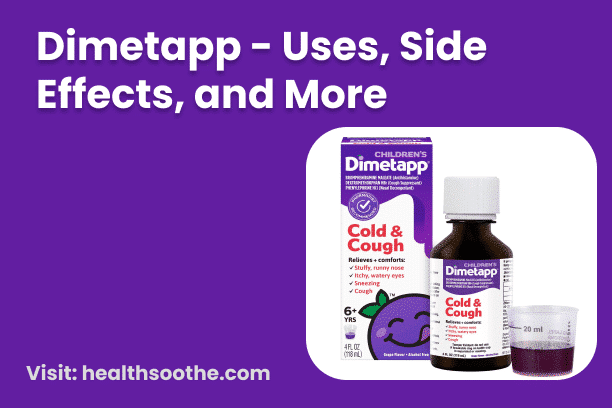This combination medication (Dimetapp) is utilized to alleviate symptoms associated with the common cold, flu, allergies, hay fever, and other respiratory ailments (such as sinusitis and bronchitis). Dextromethorphan functions as a cough suppressant by acting on a specific part of the brain responsible for coughing, diminishing the urge to cough. Decongestants help alleviate nasal congestion.
Antihistamines alleviate symptoms like watery eyes, itchy eyes/nose/throat, runny nose, and sneezing. It's important to note that cough-and-cold products are not proven to be safe or effective for children under 6 years of age.
The use of such products for cold symptoms in children under 6 years should be directed by a doctor. Additionally, some long-acting tablets/capsules are not suitable for children under 12 years of age. Consult your doctor or pharmacist for guidance on using the product safely. These products do not cure or shorten the duration of the common cold and may lead to severe side effects.
To mitigate the risk of such effects, strictly adhere to all dosage instructions. It's not advisable to use this product to induce sleepiness in children. Refrain from administering other cough-and-cold medications that might contain the same or similar ingredients (refer to the Drug Interactions section). Consult the doctor or pharmacist for alternative methods to alleviate cough and cold symptoms (such as proper fluid intake, using a humidifier, or employing saline nose drops/spray).
How to use Dimetapp
If you're using the over-the-counter version, carefully read all instructions on the product package before taking this medication. Should you have any queries, consult your pharmacist. If your healthcare provider has prescribed this medication, take it as instructed.
Ingest this medication orally with or without food, along with a full glass of water (8 ounces or 240 milliliters), or as directed by your doctor. If stomach upset occurs, this medication can be taken with food or milk.
If the liquid form is being used, employ a medication measuring device to accurately measure the prescribed dose. Refrain from using a regular household spoon. If the liquid is a suspension, make sure to shake the bottle well before each dose.
For those using extended-release capsules, swallow them whole. Do not crush or chew these capsules or tablets, as doing so could result in the immediate release of the entire dose, increasing the likelihood of side effects. If the extended-release tablets possess a score line, only split them as instructed by your doctor or pharmacist. Consume the whole or split tablet without crushing or chewing.
Chewable variants of this medication should be chewed thoroughly before being swallowed.
For those using the powder form, thoroughly mix it with the appropriate amount of liquid and stir well. Consume all of the liquid immediately; do not prepare a batch for future use.
The dosage is determined by your age, medical condition, and response to the treatment. If this medication is being taken for allergy or hay fever symptoms, adhere to a regular dosing schedule to obtain the maximum benefit.
Misuse of this medication (abuse) may result in serious harm, including brain damage, seizures, or even death. Avoid increasing the dose, using it more frequently, or extending its use beyond the directed duration.
Can Dimetapp and Tylenol go together
No interactions were found between Dimetapp Children's Cold & Allergy and Tylenol. However, this does not necessarily mean no interactions exist. Always consult your healthcare provider.
Side Effects
You may experience drowsiness, dizziness, headache, blurred vision, upset stomach, nausea, constipation, or dryness in the mouth, nose, or throat while taking this medication. If any of these effects persist or worsen, promptly inform your doctor or pharmacist.
To alleviate dry mouth, you can suck on sugarless hard candy or ice chips, chew sugarless gum, drink water, or use a saliva substitute. It's worth noting that this medication can lead to the drying and thickening of mucus in the lungs, potentially making breathing and lung clearance more challenging. To counteract this effect, make sure to drink ample fluids, unless otherwise advised by your doctor.
To mitigate the risk of dizziness and lightheadedness, make a gradual transition from sitting or lying down to standing up.
Should your doctor have prescribed this medication, it's important to remember that they have assessed that the benefits outweigh the potential side effects. It's worth noting that many individuals using this medication do not experience severe side effects.
Promptly notify your doctor if you experience any significant side effects, including alterations in mental state or mood (such as confusion or hallucinations), ringing in the ears, trembling (tremors), difficulties with urination, weakness, easy bruising or bleeding, rapid/slow/irregular heartbeat, or seizures.
Although rare, a highly severe allergic reaction to this medication is possible. If you observe any indications of a serious allergic reaction, such as rash, itching/swelling (particularly of the face, tongue, or throat), intense dizziness, or breathing difficulties, seek medical assistance immediately.
It's important to recognize that this list doesn't encompass all possible side effects. If you notice any effects not mentioned above, do not hesitate to get in touch with your doctor or pharmacist.
Precautions
Prior to initiating this product, it is advisable to inform your doctor or pharmacist if you have any allergies, whether to this product or other substances. Inactive ingredients present in this product can potentially trigger allergic reactions or other issues. To obtain further information, consult your pharmacist.
Before commencing this medication, it's crucial to provide your doctor or pharmacist with your medical history, particularly if you have a history of respiratory difficulties (such as asthma or emphysema), diabetes, a specific eye condition (glaucoma), heart problems, hypertension, kidney issues, liver ailments, seizures, stomach/intestinal problems (like ulcers or blockages), an overactive thyroid (hyperthyroidism), or problems with urination (such as issues due to an enlarged prostate or urinary retention).
This medication may induce dizziness, drowsiness, or blurred vision. It's essential to exercise caution while driving, operating machinery, or performing tasks that necessitate alertness and clear vision until you can do so safely. Limit your alcohol consumption, as alcohol or marijuana (cannabis) can intensify feelings of dizziness or drowsiness. If you use marijuana (cannabis), it's advisable to discuss this with your doctor.
This medication might contain aspartame. If you have phenylketonuria (PKU) or any other condition requiring you to limit your intake of aspartame (or phenylalanine), consult your doctor or pharmacist about the safe use of this medication.
Liquid preparations of this product may contain sugar and/or alcohol. If you have diabetes, alcohol dependency, or liver conditions, use caution. Seek advice from your doctor or pharmacist regarding the safe use of this product.
If you are scheduled for surgery, ensure that your doctor or dentist is informed about all products you are using, including prescription and nonprescription medications, as well as herbal products.
Older adults may be more prone to the side effects of this drug, particularly dizziness, drowsiness, alterations in mental state, constipation, rapid heartbeat, difficulties with urination, and changes in blood pressure. The combination of dizziness, drowsiness, and confusion heightens the risk of falling.
Children may be more sensitive to the side effects of antihistamines. In young children, this medication may induce agitation or excitement instead of drowsiness.
During pregnancy, it's advisable to use this medication only if absolutely necessary and under the guidance of your doctor. Weigh the potential risks and benefits in consultation with your healthcare provider.
This medication could pass into breast milk. Prior to breastfeeding, consult your doctor for guidance.
Interactions
Interactions between drugs have the potential to alter how medications function or increase the likelihood of experiencing serious side effects. The information provided here does not encompass all potential drug interactions. It is crucial to maintain a record of all products you are using, including prescription and over-the-counter drugs, as well as herbal supplements, and share this list with your doctor and pharmacist. Altering, initiating, or discontinuing medications should be done only under the guidance of your doctor.
Taking specific MAO inhibitors in conjunction with this medication could lead to a severe (and potentially fatal) drug interaction. Refrain from using isocarboxazid, metaxalone, methylene blue, moclobemide, phenelzine, procarbazine, rasagiline, safinamide, selegiline, or tranylcypromine while on this medication. Most MAO inhibitors should also be avoided for two weeks prior to and after using this medication. Consult your doctor to determine the appropriate timing for starting or stopping this medication in relation to MAO inhibitors.
Certain products that may interact with this drug include antihistamines applied to the skin (such as diphenhydramine cream, ointment, spray), beta blockers (like metoprolol, atenolol), guanethidine, methyldopa, and rolapitant.
Inform your doctor or pharmacist if you are using other products that induce drowsiness, such as opioid pain or cough relievers (like codeine, hydrocodone), alcohol, marijuana (cannabis), sleep or anxiety medications (such as alprazolam, lorazepam, zolpidem), muscle relaxants (like carisoprodol, cyclobenzaprine), or other antihistamines (like cetirizine, diphenhydramine).
Pay attention to the labels on all your medications (including allergy or cough-and-cold products), as they might contain ingredients that induce drowsiness. Consult your pharmacist for advice on using these products safely.
Certain products contain components that could influence your heart rate or blood pressure. Inform your pharmacist about the products you are using and seek guidance on their safe use, particularly cough-and-cold products or diet aids.
This medication might interfere with specific medical or laboratory tests (such as brain scans for Parkinson's disease, urine drug screening tests, and allergy skin tests), potentially leading to inaccurate test results. It's essential to ensure that both lab personnel and your doctors are aware of your use of this drug.
Read Also: Aurobindo Lorazepam Reviews
Dosage
Missed Dose
If you are following a regular dosing schedule with this product and happen to miss a dose, take it as soon as you remember. If your next dose is approaching, it's advisable to skip the missed dose and continue with your regular dosing time. Avoid doubling your dose to make up for the missed one.
Storage
Keep this product stored at room temperature, away from light and moisture. Refrain from storing it in the bathroom. Ensure that liquid forms of this medication are not subjected to freezing. It is essential to keep all medications out of reach from children and pets.
Do not dispose of medications by flushing them down the toilet or pouring them down the drain unless specifically instructed to do so. When the product is expired or no longer needed, ensure proper disposal. You can consult your pharmacist or local waste disposal company for guidance on appropriate disposal methods.



